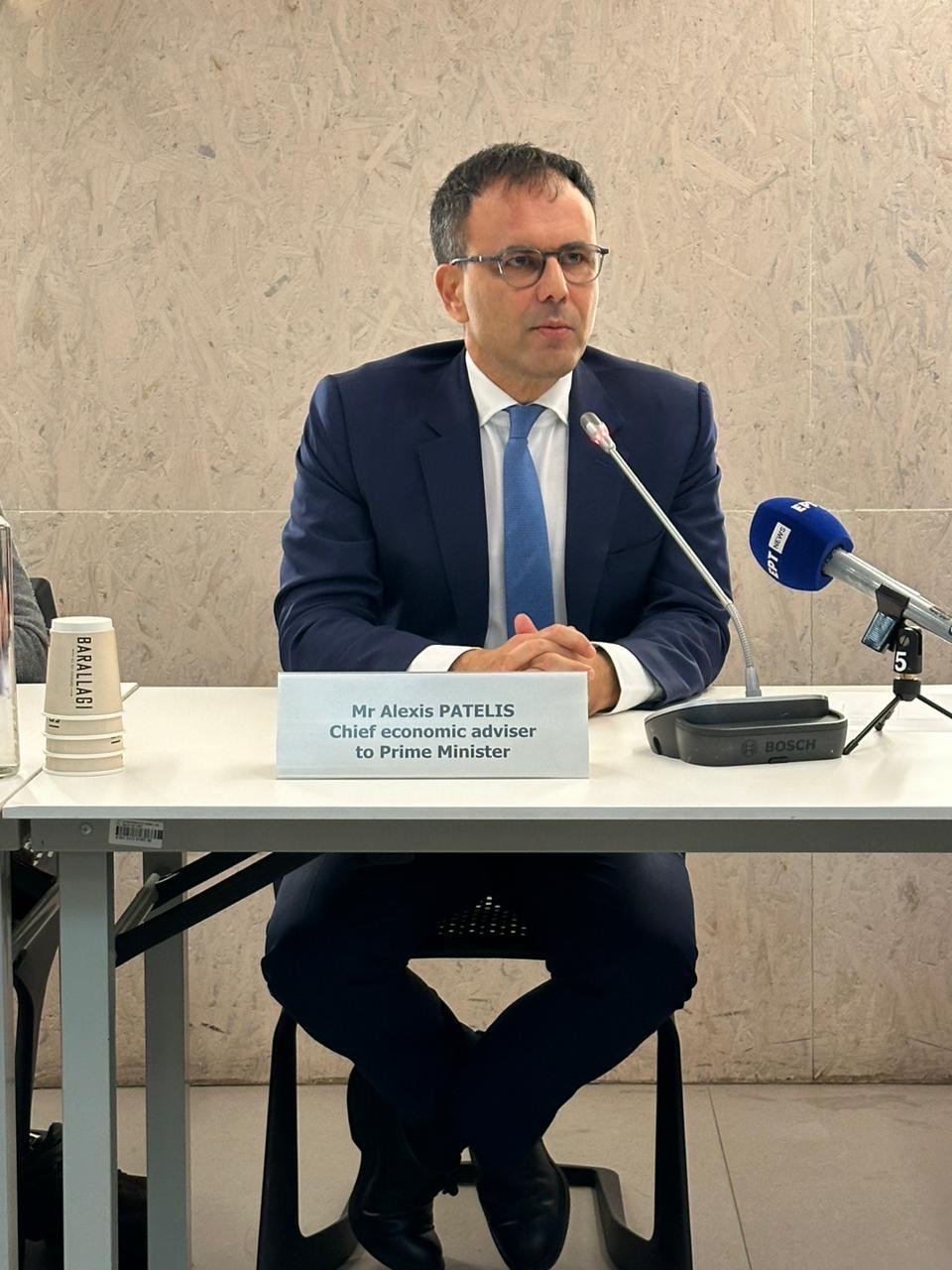The investment grade constitutes good news because it affects the reduction of borrowing costs for households, businesses, and the country, Alexis Patelis, Chief Economic Advisor to Prime Minister Kyriakos Mitsotakis, said in an interview with “Naftemporiki” and Michalis Psilos.
Patelis referred to the latest S&P upgrade and the Eurostat data, which showed that there is a very positive sign in the primary surplus.
The economic advisor of the prime minister also emphasized to “Naftemporiki” that foreign direct investments in all sectors are higher on average over the past three years.
“Our industry is one of the great successes of the past years,” he added.
Alexis Patelis also noted that “soon a legislative initiative will be announced to reduce bank charges by half, for amounts up to 10 euros.”
Finally, he cleared out that the scenarios for Prime Minister Kyriakos Mitsotakis assuming a European post in Brussels “belong to the realm of fantasy.”
The full interview with Michalis Psilos follows:
S&P Global Ratings has maintained Greece’s credit rating at the lowest notch of the investment grade (BBB-), but with a positive (from stable previously) outlook for Greek debt. How do you interpret it?
S&P is one of the four major rating agencies having upgraded the Greek economy to investment grade and now they have upgraded us to a positive outlook, which means that if we follow the same path, then they will upgrade us another notch. This development is quite important because it shows that there is a prospect of further climbing, leaving behind for good the unpredictable scenario that would take us down.
However, there are many unpredictable, mainly geopolitical, scenarios ahead of us…
It is important that the country looks ahead. “Greece was like a big fish in a small bowl, while now it is a small fish in a big bowl. It needs to grow as a fish.’
Primary surplus a positive sign
EUROSTAT announced a strong primary surplus of 1.86% for 2023 against a target of 1.15%. What is the reason?
EUROSTAT data showed that there is a very positive sign in the primary surplus. It was much higher -1.9%- than the expected 1.1% and this is mainly due to the excess of revenues from the ongoing fight against tax evasion. All this despite the unpredictability of the significant support and recovery costs after storm Daniel, a natural disaster that also had a negative impact on GDP, with a slight lag in our growth target. Nevertheless, the debt-to-GDP ratio decreased significantly, and our country remains the country in the EU with the largest reduction in this ratio since 2019. For this year, the target for a primary surplus of 2.1% remains, but also for the following years, as well as other reductions in debt as a percentage of GDP.

Reforms
The Minister of National Economy, Kostis Hatzidakis, emphasized that the S&P report gives us strength to continue the effort and promote all the necessary reforms that will lead the Greek economy even higher. Exactly what reforms are we talking about?
A lot has been done over the last years, a lot more needs to be done. The government continues to implement its program described as multidimensional modernization by the Prime Minister and the priorities are as follows:
- Acceleration in the administration of justice, a goal that also has financial dimensions and now the new judicial charter will be voted and implemented, which will reduce the waiting time for the final issuance of decisions from 1,500 days to 1,000, i.e. by a third.
- The fight against tax evasion, which has both a social and financial impact, remains a major goal, but also has another important dimension: Everyone must be remunerated according to what they produce.
- The big bet of connecting cash registers with POS is completed. The provisions of the bill passed last year are being implemented, such as the ban on the use of cash in the purchase and sale of real estate, and the business plan of AADE is being implemented.
- Incentives are also given for company mergers. Most international organizations agree that SMEs need to be supported to grow.
- A very important reform is the way in which people are chosen for positions of responsibility in the public sector, with competitions and meritocratic criteria. The process for managers in hospitals has already been completed, where more than 1,000 candidates were examined, and this will continue for all positions of responsibility in the public sector.
- The digital revolution that continues and requires time in its implementation for the digitization of health records, pensions, court decisions, etc.
- The Green revolution, where our country is already moving forward decisively with many renewable energy sources, electric mobility, networks, etc.
- And finally the expansion of the workforce because in our country today the unemployment rate has decreased and many employers complain that they cannot find workers, as the workforce that exists in Greece falls short of the European average.
The opposition claimed that the “BBB upgrade did not positively affect the lives of citizens in any way.” How do you comment on that?
The citizens do not want us to return to the periods of crisis. When a foreign investor wants to invest in our country, he also reads the reports of the rating agencies. When we were in the “junk” category, obviously it was more difficult for an investor to make the decision to come to our country, while now that we have the investment grade, they consider us a stable country.
However, the investment grade also affects the cost of borrowing for households and businesses and the cost of borrowing in Greece – the difference in the spread of the cost of borrowing in relation to the German one – has been compressed in Greece. So these reports are important and constitute good news because they lower the cost of borrowing and this helps the development of the country.
Golden visa and Airbnb
According to the NYT, real estate prices in Greece have skyrocketed because of the golden visa and the Greeks can’t afford them. Meanwhile, rents have soared as a result of Airbnb. What do you think?
In 2023 we had 1,802 golden visa applications approved and 123,000 property transfers taking place. I wish the problem would be solved only by banning the golden visa. Unfortunately, it is not so. Of course, since the end of August, the acquisition of a golden visa through real estate has increased to 800,000 euros, so this method will concern very few.
Regarding Airbnb, there have been interventions that will be evaluated and if necessary we will do more to find the right balance.
The issue of rents and property prices is tackled by the government with many tools. For example, there are still hundreds of thousands of foreclosed properties that, if they were made available to the market, would obviously push prices down. Today, the “Renovate-Rent” program is running, with which approximately 12,000 homes will be subsidized for renovation to cover the costs by 40% up to 10,000 euros and even with a 50% advance payment.
The problem of rising rents and property is real cannot be easily resolved and it will take a lot of action by the government.
Wall Street giants “vote” in favor of European banks, stressing that they are in much better condition than American ones. What about the Greek banks?
The Greek banking system is in a completely different situation than it was in 2019, when bad loans made up half of their portfolio. We have left all this behind us with the “Hercules” program and the recapitalizations and share capital increases of the banks, the new bankruptcy code and gradually with the disinvestment of the public sector.
Priorities of the government’s policy are in principle the stimulation of competition, as well as creating another pole, such as with the merger of the Bank of Attica with Pancreta.
Our priority is also the reduction of charges and initiatives in this area that will be announced soon.

Legislative initiative to reduce bank charges
I would like to focus on the issue of high charges, given that bank lending – also due to the ECB’s high interest rates – remains difficult for many households and small and medium-sized enterprises.
Our priority is also the reduction of charges and initiatives in this area will be announced soon, such as a legislative initiative to halve charges for amounts up to 10 euros.
High prices
High prices are now the biggest problem that households are facing today. There is of course an increase in their income, but they see that part of the income is eaten away by the soaring prices.
This is a global phenomenon; our country is not significantly different – in fact compared to the EU average the cumulative price increase is lower.
The government has and continues to deal with it in various ways. The increase in the minimum wage that we have seen is one measure. The minimum wage has increased by 27% and prices cumulatively by just under 20%. The market interventions that the Ministry of Development has made – on baby formula, on the profit margin, on the fines on companies – are also important.
What is the timetable for raising the minimum wage to 950 euros and the average wage to 1500 euros?
The end of the four-year period remains the target for both of these increases. (Obviously unless something shocking happens by then). It is important to have visibility and a compass for households to know where they are going.
There is, of course, the ultimate goal of converging wages with the EU average.
There are reports that Prime Minister Kyriakos Mitsotakis will succeed Ursula von der Leyen in the presidency of the European Commission. Can you please comment on this;
The answer is no. The prime minister renewed his mandate a year ago with a program of multidimensional modernization. For 10 months, the government has been working hard with reforms and the prime minister will continue to implement this program by the end of his four-year term in 2027. The rest belongs to the realm of imagination.

 1 εβδομάδα πριν
1 εβδομάδα πριν





 Greek (GR) ·
Greek (GR) ·  en_UK ·
en_UK ·